Powerful Benefits of Daily Meditation for Women
In the hustle and bustle of our daily lives, finding a moment of peace and tranquility can seem like an impossible task.
That’s where meditation comes in. This ancient practice has been gaining popularity in recent years and for good reason.
Not only is meditation good for your overall well-being, but it’s particularly beneficial for women. Yes, ladies, you heard that right!
In this post, we’ll explore the different types of meditation, delve into the incredible benefits of daily meditation for women, and provide some tips on getting started.
So, grab a cozy blanket, make yourself a cup of tea, and dive in!
This post may contain affiliate links. Click to visit policies and disclosures

What is meditation?
At its core, meditation is all about finding mental and emotional calmness.
It’s a way to focus on the present moment and shut out the outside world’s distractions.
Picture yourself in a serene oasis where the stress and worries of everyday life melt away. That’s the power of meditation.
Various techniques to achieve a meditative state include mindfulness, breathing exercises, and visualization.
The beauty of meditation lies in its versatility—you can choose the method that resonates with you the most.
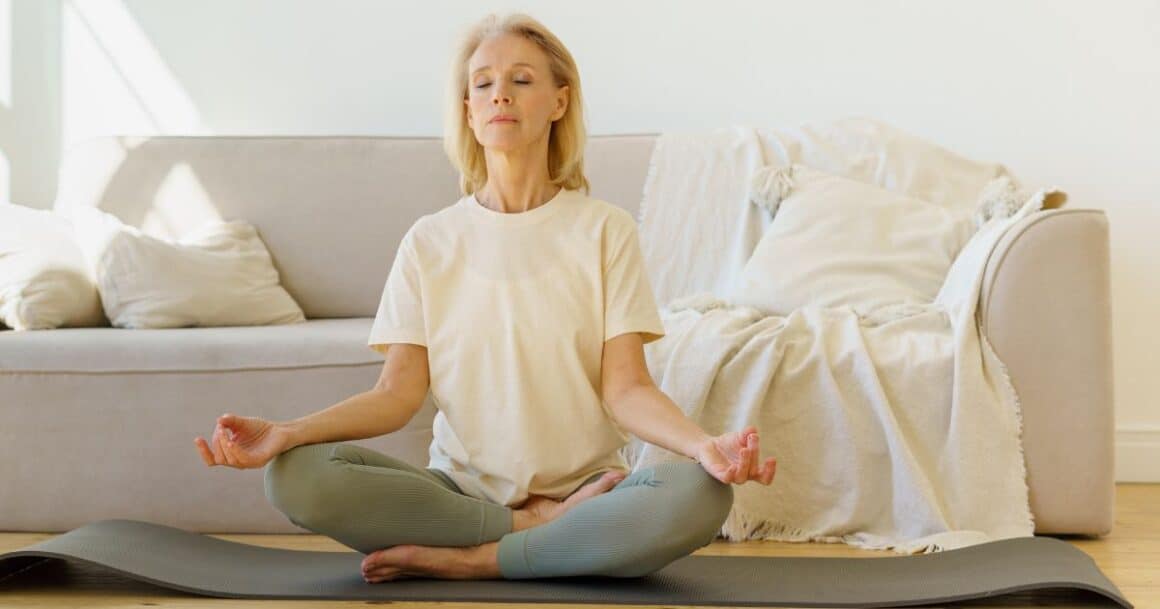
What are the Different Types of Meditation?
When it comes to meditation, there’s a treasure trove of techniques to discover.
Each type offers its own unique approach to finding inner peace and calm.
Let’s dive into a few popular ones:
Mindfulness Meditation
This type of meditation invites you to be fully present in the moment. It focuses on cultivating awareness of your thoughts, emotions, and sensations without judgment.
Whether you choose to concentrate on your breath, a specific object, or the sounds around you, mindfulness meditation helps you develop a deep sense of presence.
Transcendental Meditation (TM)
TM is a widely practiced form of meditation involving a mantra—a repeated sound, word, or phrase.
You can access a state of deep relaxation and heightened consciousness by gently repeating the mantra. It’s like a blissful escape from the chaos of everyday life.
Loving-Kindness Meditation
Also known as Metta meditation, this practice focuses on cultivating compassion and love towards oneself and others.
It involves silently repeating phrases of well-wishes and extending positive intentions to yourself, loved ones, acquaintances, and even challenging individuals. It’s a beautiful way to foster kindness and connection.
Guided Meditation
Guided meditation is perfect for beginners or those who appreciate some gentle guidance along the way.
In this practice, you follow the instructions of a recorded voice or guide who leads you through various visualizations and prompts.
It’s like having a supportive companion walking you through the meditation journey.
Movement Meditation
Movement meditation provides an alternative path to mindfulness for those who struggle to sit still for extended periods.
This practice involves slow and intentional movements, such as walking, yoga, or Tai Chi.
You can cultivate a sense of inner calm and mind-body connection by syncing your breath with your movements.
Visualization Meditation
In visualization meditation, you use the power of your imagination to create mental images that evoke relaxation and positivity.
It can involve imagining yourself in a serene natural setting, visualizing goals and aspirations, or even picturing healing energy flowing through your body. It’s like painting a beautiful mental landscape to nourish your soul.
Breathing Meditation
Breathwork is at the heart of many meditation practices. By focusing on your breath—the inhales and exhales—, you bring your attention to the present moment and anchor yourself in the here and now.
It’s a simple yet powerful technique that can be incorporated into various meditation styles.
These are just a few examples of the diverse range of meditation types available. Feel free to explore and experiment with different techniques to find the ones that resonate most with you.
Meditation for Christians
Meditation is the same for Christians as it is for anyone else; the only difference is what you focus on while meditating.
When doing Christian meditation, you would focus on scripture, readings, or prayers.
Related article: How to Meditate as a Christian

The Benefits of Daily Mediation for Women
Daily meditation is like a superpower that can transform your life in incredible ways.
From boosting your well-being to improving your overall outlook, the benefits are boundless.
A Few of the Main Benefits of Daily Mediation for Women:
Reduced Stress and Anxiety
Picture this—when you meditate, you create a calm oasis amidst the storm of daily life.
By allowing ourselves to be fully present at the moment and letting go of worries, meditation becomes a powerful tool for managing stress and anxiety.
Mediating can help us find our way to inner peace, navigate challenges with clarity, and cultivate a sense of serenity.
Enhanced Emotional Well-being
Daily meditation has a magical way of shifting the emotional landscape.
It can provide a fresh perspective on stressful situations, helping us to respond with greater clarity and composure.
As we become more self-aware through meditation, we can develop the skills to manage emotions, reduce negativity, and increase positive feelings of joy and contentment.
Sounds pretty awesome, right?!
Improved Sleep Quality
Meditation has been shown to promote better sleep patterns, making it a dream come true for those struggling with insomnia or restless nights.
By quieting the mind, relaxing the body, and letting go of the day’s concerns, meditation helps you drift off into a peaceful slumber and wake up feeling refreshed.
Boosted Focus and Productivity
Got brain fog? Yeah…me too! The good news is meditation can sharpen your concentration.
Regular practice enhances your ability to stay present and focused, making you more efficient and productive in daily tasks.
It’s like a relaxing workout for your brain! (source)
Increased Self-Awareness
Imagine peeling back the layers of your being to uncover your true essence. That’s what daily meditation offers—deep self-awareness. Pretty cool, right?!
Through meditation, we can profoundly understand ourselves by turning inward and observing our thoughts, emotions, and sensations without judgment.
This self-awareness fosters personal growth, self-compassion, and a stronger connection to our authentic selves.
Physical Health Benefits
The benefits of meditation aren’t confined to the realm of the mind—they extend to your physical well-being too.
Research suggests that meditation can positively impact various medical conditions such as anxiety, asthma, chronic pain, depression, heart disease, high blood pressure, and sleep problems.
It’s a holistic approach that nourishes both body and soul.
Improved Mood
Daily meditation has a remarkable ability to uplift and improve mood.
By quieting the mind and cultivating inner peace, women can experience a positive shift in their emotional state.
Studies have shown that regular meditation can lead to increased feelings of well-being, decreased feelings of negativity, and a greater sense of overall happiness. (Source)
Enhanced Resilience
Life can throw curveballs at us, but daily meditation can strengthen our resilience to bounce back.
Through meditation, you cultivate patience, tolerance, and inner strength that help us weather life’s storms with grace.
Supporting Hormonal Balance and Well-being
Women’s hormonal balance can greatly impact their well-being.
Research suggests meditation can positively influence hormonal health by reducing stress and improving emotional regulation.
Daily meditation becomes a gentle support system that helps women navigate the fluctuations of their hormonal journey with greater ease and balance. (source)
Related Article: Stressed? You need a stress management plan!

How to Start Meditating (Tips for Beginners)
Create a Peaceful Space
Find a quiet and comfortable spot to dedicate time to your meditation practice. It could be a cozy corner in your home or a serene outdoor setting.
Make it your sacred space, free from distractions.
Start Small
Begin with just a few minutes of meditation each day. As a beginner, it’s essential to ease into the practice and gradually increase your meditation time.
Consistency matters more than duration.
Get Comfortable
Find a posture that works for you.
Whether sitting cross-legged on a cushion, in a chair with your feet planted firmly on the ground, or even lying down, choose a position that allows you to relax while remaining alert.
Focus on the Breath
A fundamental aspect of meditation is focusing on your breath. Pay attention to the sensation of each inhale and exhale.
If your mind wanders, gently guide your focus back to the breath without judgment.
Be Gentle with Yourself
Remember, meditation is not about perfection. Your mind may wander, thoughts may arise, and that’s okay.
Embrace those moments as part of the practice. Offer yourself compassion and return to the present moment.
Guided Meditations
If you prefer some guidance, try using guided meditation apps or recordings. They provide step-by-step instructions, making staying focused and relaxing your mind easier.
Consistency is Key
Make meditation a regular part of your daily routine.
Set a specific time each day to dedicate to your practice. It could be in the morning to start your day calmly or in the evening to unwind and find inner peace before bed.
Explore Different Techniques
There are various meditation techniques available, such as mindfulness, loving-kindness, or visualization. Explore different styles to find the ones that resonate with you the most.
Join a Community
Consider joining a meditation group or online community. Connecting with fellow practitioners can provide support, encouragement, and a sense of camaraderie on your meditation journey.
Patience and Persistence
Like any skill, meditation takes time and practice to develop.
Be patient with yourself and embrace the process. Celebrate the small victories and let go of expectations.
More Self-Care Articles:
- Self-Care Ideas for Women
- How to Cultivate Gratitude
- Morning Pages Journaling
- How to Start a Self-care Routine
- 100 Things to Put in Your Purse
- Dealing with Midlife Crisis
- How to Set Healthy Boundaries
- The Self-care Alphabet
- Gratitude VS Appreciation
- The Best Hobbies for Women Over 50
- Life Essentials for Women
- The Eight Types of Self-Care
- Need a New Hobby?
The Best Time to Meditate
So, you may be thinking, “When is the best time to mediate?”
There’s no one-size-fits-all answer regarding the best time to meditate. It largely depends on your personal preference and schedule.
Here are a few suggestions on good times to meditate:
Meditating in the Morning
Many experts recommend starting your day with meditation. It sets a positive tone for the rest of your day and allows you to begin with a calm and centered mindset.
Related article: How to Start a Morning Self-care Routine
When You’re Feeling Anxious or Stressed
If you find yourself overwhelmed or needing a mental reset, meditation can help you settle your mind, feel more relaxed, and gain clarity on the appropriate next steps.
Related article: How to Develop a stress management plan
After Work
Some people find that meditating at the end of the workday helps them transition and create a boundary between work responsibilities and personal life.
It’s a way to relieve the day’s stress and rejuvenate your mind.
Before Bedtime
I love to meditate before bedtime.
It’s a beautiful way to wind down, release tension from the day, and prepare your mind and body for a restful night’s sleep.
Try incorporating a sleep meditation into your nighttime routine—you’ll be amazed at the difference it can make.
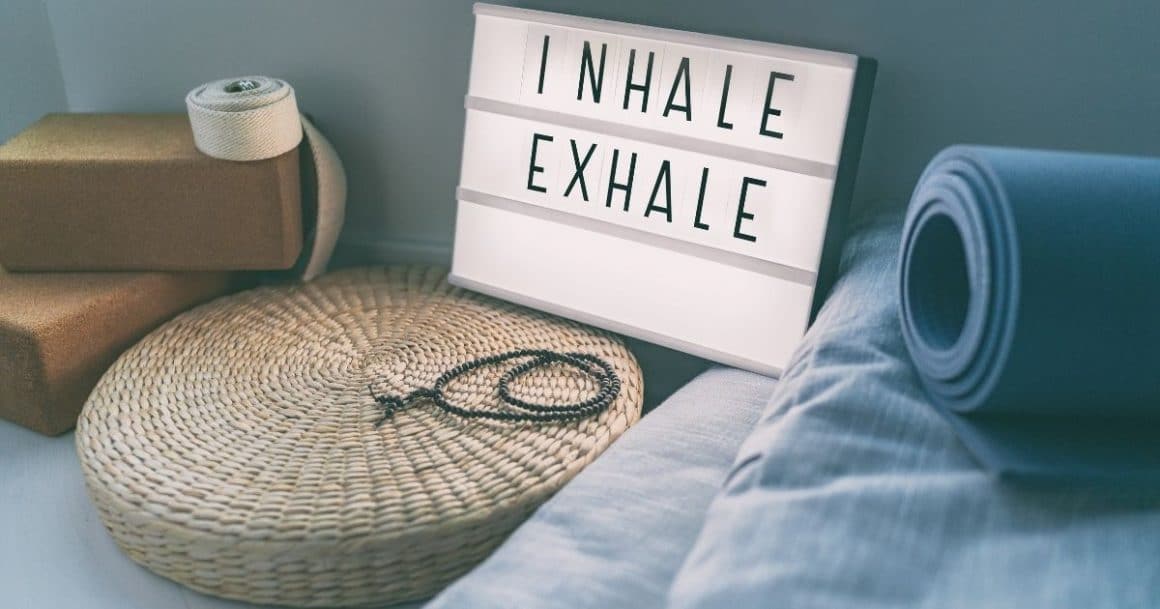
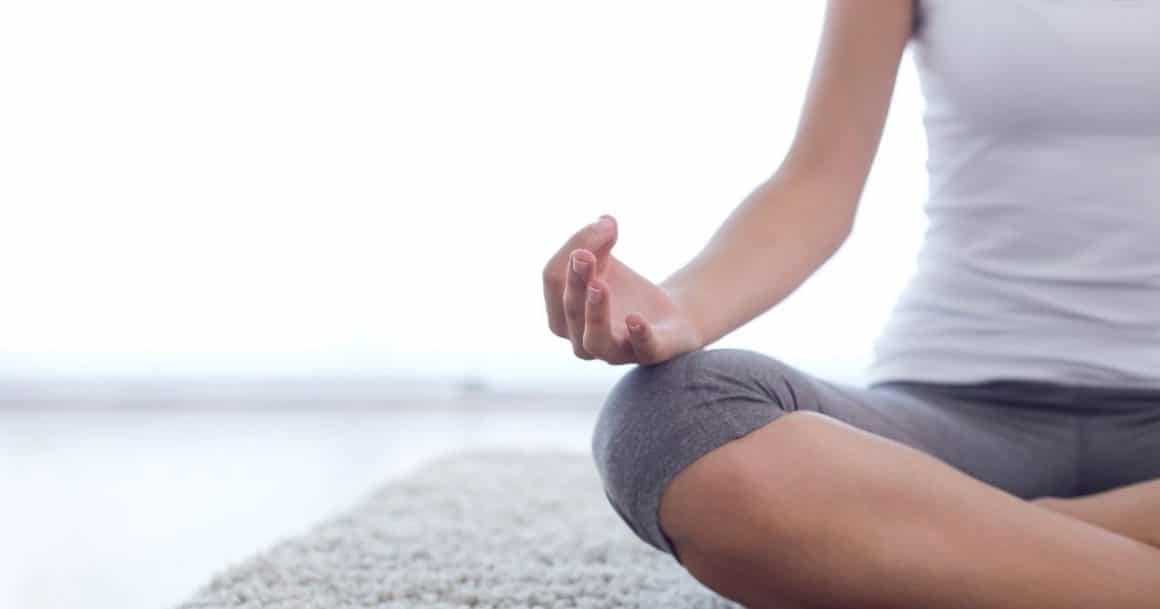
The Importance of Breathwork in Meditation
Let’s take a moment to chat about the power of breathwork in daily meditation.
When we focus on our breath, we can quiet the monkey mind and anchor ourselves in the present moment.
Here are a few tips for incorporating breathwork into your meditation practice:
Deep, Cleansing Breaths
During meditation, practice taking slow, deep breaths in through your nose and out through your mouth. Feel the sensation of the breath filling your lungs and visualize releasing any tension or stress with each exhale.
Counting Your Breaths
To help maintain focus, you can count your breaths. Inhale for a count of four, hold for a count of four, and exhale for a count of four.
Adjust the counts to a rhythm that feels comfortable for you.
Using Mantras or Affirmations
Mantras are powerful tools in meditation. Choose a word or phrase that resonates with you and repeat it silently or aloud with each breath.
It can be something like “peace,” “calm,” or “I am present.”
Related Article: 100 Powerful Affirmations for Women
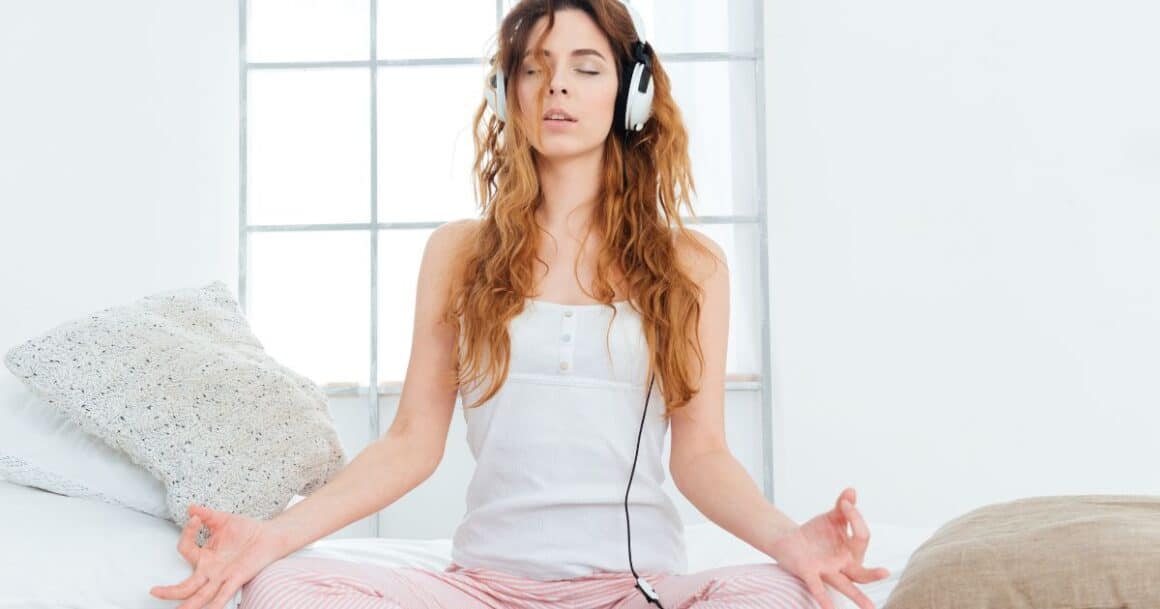
Meditation Apps to Enhance Your Practice
In this digital age, we have abundant resources at our fingertips, and meditation apps are no exception.
Here are a few of my favorite meditation apps that can support your daily meditation practice:
Headspace meditation app
Headspace is an excellent option for beginners, offering 10-minute meditation sessions that gradually get longer.
This app also has various topics, so you can find the type of meditation that works best for you. For example, I love the headspace and used it for many years when I first learned how to meditate.
I highly recommend Headspace!
Calm Meditation App
Calm is another popular meditation app for women, focusing on mindfulness and relaxation.
This app features daily meditations ranging from 3 to 25 minutes, sleep meditations, breathing exercises, and guided imagery.
Insight Timer Meditation App
Insight timer is another great option for daily meditation, as it offers a wide variety of free meditations that can help you relax and de-stress.
This app also has a community feature to connect with other meditators and share your experiences.
I use Insight timer mostly at night for sleep mediations. (I use the free version, and it’s excellent!)
Abide Meditation App
The Abide bible meditation app is another great option for daily meditation while focusing on biblical principles.
The Abide app features a variety of guided bible meditations that help you connect with God and deepen your relationship with him.
Whether you are a beginner or an experienced meditator, abide meditation app has something for everyone.
Sanity & Self-meditation app
This is a great GIRL POWER app!
Sanity & self app is another excellent daily meditation app for women, as it offers daily meditations and mindfulness exercises to improve your mental health.
So if you are looking for a daily meditation practice that can help you improve your mental health, this is a great option.
I had a subscription to Sanity & Self for a year and loved it!
Related Article: The Best Self-Care Apps for Women

The Power of Meditation Stones and Crystals
If you want to add something to your meditation practice, meditation stones and crystals can be a beautiful and grounding addition.
These natural gems have unique properties and benefits that can enhance your meditation experience.
Here are a few popular options:
Amethyst
Known for its calming and soothing properties, amethyst is often used to promote relaxation and spiritual growth. I have this Amethyst stone and love it!
Rose Quartz
Rose Quartz is associated with love, compassion, and emotional healing. It can help cultivate self-love and deepen connections with others.
Celestite
- Tranquility: Its calming energy creates serenity during meditation.
- Spiritual Connection: Celestite opens channels to intuition and higher realms.
- Clarity and Focus: Its high vibration clears mental fog and improves concentration.
- Emotional Healing: Celestite soothes and promotes emotional well-being.
Citrine
A stone of abundance and positivity, citrine is believed to bring joy, confidence, and success. It’s like a burst of sunshine in crystal form.
Garnet
With its grounding and revitalizing energy, garnet is said to promote courage, passion, and vitality. It can help you tap into your inner strength.
Obsidian
This protective stone is excellent for grounding and shielding against negative energy. It’s like having a powerful shield of positivity around you during meditation.
Lapis Lazuli
Lapis lazuli is often associated with spiritual awakening and inner truth. It can enhance intuition, clarity, and self-expression.
Remember, the choice of crystals is a personal one. Trust your intuition and choose the ones that resonate with you.
You can hold them in your hands, place them nearby during meditation, or even incorporate them into a crystal grid.
They can serve as gentle reminders of your intentions and provide an additional source of calm and focus.
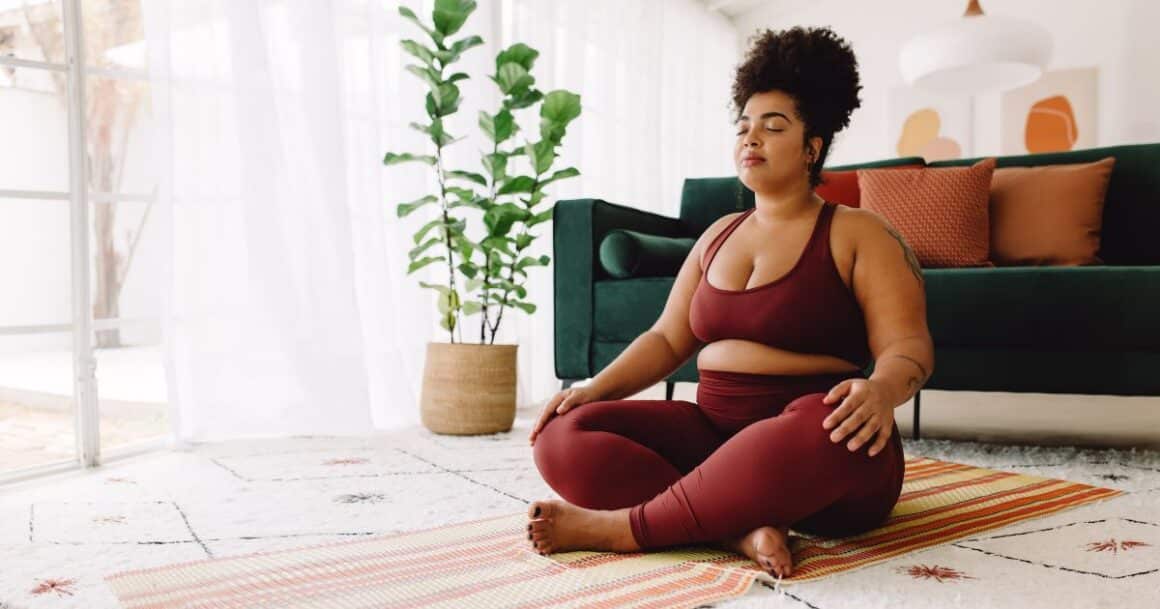
FAQs: Benefits of Daily Meditation for Women
How long should I meditate as a beginner?
As a beginner, start with just a few minutes of meditation each day and gradually increase the duration.
Consistency matters more than the length of each session. Find a duration that feels comfortable for you and gradually build from there.
Can meditation help with reducing stress and anxiety?
Absolutely! Meditation is a powerful tool for managing stress and anxiety. Regular practice allows you to create a sense of calm and inner peace, enabling you to navigate life’s challenges with greater clarity and composure.
Do I have to sit cross-legged to meditate?
Not at all! The beauty of meditation is that you can adapt it to suit your comfort. You can sit cross-legged on a cushion, sit in a chair with your feet grounded, or even lie down if that’s more comfortable for you. The key is to find a posture that allows you to relax while remaining alert.
Can I meditate if I’m not religious or spiritual?
Definitely! Meditation is a practice that transcends religious and spiritual beliefs.
It’s a tool for cultivating mindfulness, self-awareness, and inner peace. You can approach meditation from a secular perspective and enjoy its benefits regardless of your spiritual or religious background.
Remember, these are just a few common questions about meditation and a vast world of knowledge and experience is waiting for you.
Don’t hesitate to explore, experiment, and find what resonates with you on your meditation journey.
What is the “monkey mind” in meditation?
Ah, the “monkey mind”! It’s a term often used in meditation circles to describe the constant chatter of thoughts and restlessness that can arise during our practice.
Just like a mischievous monkey swinging from tree to tree, our minds can jump from one thought to another, making it challenging to stay focused and present.
During meditation, the monkey mind can manifest as a stream of thoughts, worries, or distractions while you cultivate stillness and inner calm.
It’s completely normal and happens to everyone, especially beginners. So, if you find your mind wandering off during meditation, know you’re not alone!
The key is to gently notice when the monkey mind appears, without judgment or frustration, and guide your focus back to your breath or chosen point of meditation or your breath.
Over time and with practice, you’ll develop greater control over your thoughts and cultivate a calmer state of mind.
More Articles for Women
- Gratitude VS Appreciation
- How to Develop a Growth Mindset
- Best Self-care Ideas for Women
- The Best Nighttime Self-care Routine for Women
- How to Reinvent Yourself at 50
- Be Kind to Yourself Quotes
- Nighttime Prayers and Affirmations
- How to Practice Spiritual Self-care
- How to Mediate as a Christian
- 100 “I AM” Affirmations for Women
Conclusion: The Benefits of Daily Meditation for Women
Daily meditation greatly benefits women in our fast-paced and often hectic world.
It offers a sanctuary of peace and clarity amidst the chaos, allowing you to tap into your inner strength and find balance.
Whether you meditate for a few minutes or dedicate longer sessions, the key is to find a daily meditation routine that works for you and stick with it.
So, why not give it a try?
Create that safe space, find your favorite meditation style, and take that first step towards a calmer, more centered life.
Share your thoughts and experiences in the comments below—I’d love to hear how daily meditation has impacted your well-being.
Until next time, take a deep breath, exhale, and be well on your meditation journey!
XO, Christine

I’ve been keeping it real since 1963. 😊
I’m a child of God, devoted wife, proud mama and grandma, full-time creative, domestic engineer, and passionate self-care enthusiast.
I’m purpose-driven and do my best to live each day with intention—whether shopping for treasures, painting in my art studio, digging in the garden, or cooking up something yummy for my family.
I’m always up for a good chat and love collaborating with fellow creatives and brands.
Let’s connect—don’t be shy!










